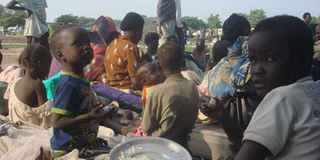South Sudan govt 'let soldiers loot, rape and kill' after peace deal - Amnesty

This handout image provided by the UNMISS (United Nation Mission in South Sudan) on July 11, 2016 shows some of the at least 3,000 displaced women, men and children taking shelter at the UN compound in Tomping area in Juba. PHOTO | AFP
What you need to know:
- Soldiers under President Salva Kiir accused of targeting civilians in opposition stronghold of Unity State, violating and killing them at will.
- Interviewees described incidences where men, women and children were killed or kidnapped as they fled the violence.
- In one instance, a woman who left her child at home and fled came back later to find the boy had been thrown back in the house and set on fire.
South Sudan government “let” its soldiers to kill, loot and rape civilians, even after the signing of the peace agreement, global human rights lobby Amnesty International (AI) says.
In a repeated charge of war crimes and crimes against humanity levelled against the government of South Sudan, the human rights watchdog claims soldiers in the Sudan People’s Liberation Army (SPLA) under President Salva Kiir targeted civilians in opposition stronghold of Unity State, violating and killing them at will.
It is a charge Juba immediately denied again, but AI says in a report it published Wednesday evening that soldiers under Kiir fought both combatants and defenceless civilians in areas deemed to support sacked vice-president Riek Machar.
“Residents of Leer County described a regular pattern of targeted attacks against fleeing civilians during attacks by government forces on villages in opposition-held areas between August 2015 through December 2015,” AI said in the report titled "We are still Running: War Crimes in Leer, South Sudan".
“During these raids government forces appeared to target in particular civilians who were running away with their cattle.
“In many cases these forces also interrogated civilians about where cattle were being kept, suggesting that stealing cattle may have been a key motivation for these attacks.”
Leer, in Unity State, is the hometown of rebel leader Riek Machar who penned a peace agreement with President Kiir in Addis Ababa after a mediation by the Intergovernmental Authority on Development (Igad).
Mr Machar was fired from the transitional government this week, two months after he agreed to form it.
AI says it interviewed 71 people, 26 of who were women in the area. They all described incidences where men, women and children were killed or kidnapped as they fled the violence.
“Children were shot while fleeing or hiding and in one case a witness said that a child was burnt alive by government forces.
“In some cases, interviewees also described the death of children from drowning while they hid in the swamps and rivers during government attacks,” the 51-page document says.
In one instance, a woman who left her child at home and fled came back later to find the boy had been thrown back in the house and set on fire.
Others reported seeing women taken in groups and raped in turns. Others drowned in nearby swamps as they hid from the soldiers “in uniform.”
On Wednesday evening, Juba refuted the findings, accusing Amnesty International of perpetuating “a single storyline.”
“This is not the first time Amnesty International is reporting on Unity State. We wonder why they focus on the home town of Dr Riek Machar all the time instead of also seeking the stories of people in areas that support the government,” Mr Jimmy Makuach, the South Sudan Deputy Ambassador to Kenya told the Nation.
'FALSIFIED STORIES'
“These are falsified stories because these are people who are not on the ground. When you interview people from one side of the conflict, you can only get a single storyline,” he argued.
AI says in the report that it presented findings to the SPLA Chief of General Staff Paul Malong for a response but their letter was never replied to.
In January, it even asked the UN to impose an arms embargo, something South Sudan opposes to date.
A previous report by the African Union Commission of Inquiry on South Sudan, which was chaired by former Nigerian President Olusegun Obasanjo, accused both sides of committing war crimes.
It listed cannibalism, rape, looting and killings as crimes soldiers from both sides committed.
AI has also previously written damning reports on South Sudan before. In May this year, it accused the government of holding its war prisoners in squalid conditions where some suffocated.
A year after the conflict started in December 2013, the group with other human rights organisations called for sanctions against those behind the violence.
AI says in its latest report that the violations require criminal investigations and “the need to end the culture of impunity that creates a context in which such acts are perpetrated without any fear of repercussion.”
The group urged the African Union establish the Hybrid Court for South Sudan (HCSS) “in a format that complies with international law” as set out in the peace agreement.
But President Kiir, it added, should start releasing all abducted women.





